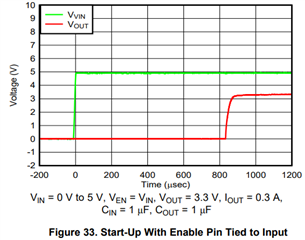Hi,
I am planning on using TPS7A25 in an application which imposes a limit on total capacitance allowed during initial turn-on for the first 20ms to avoid tripping of the upstream inrush current limiter. How can I compute the total equivalent capacitance seen by the input (Vin) in the first 20ms for this component?
I am assuming both the input and output capacitance of TPS7A25 has an effect on the inrush current. Is the following method accurate:
C_equivalent_total = Cin + [(Cout x Vout^2)/Vin^2]
The output capacitance of TPS7A25 is scaled from the output voltage rail to the input voltage rail using the capacitor energy formula. This would give the total capacitance seen by upstream inrush limiting circuitry for the first 20ms.
I would appreciate any support with the above.
Thank you.


